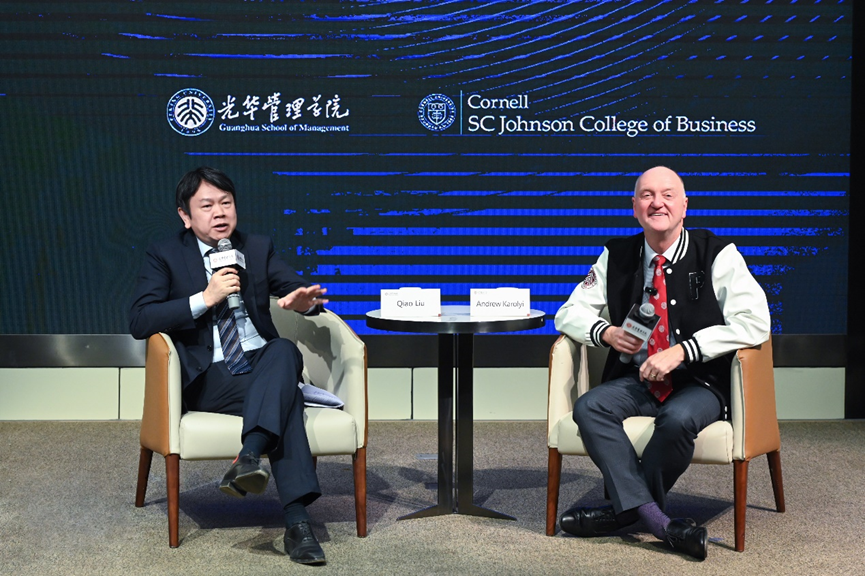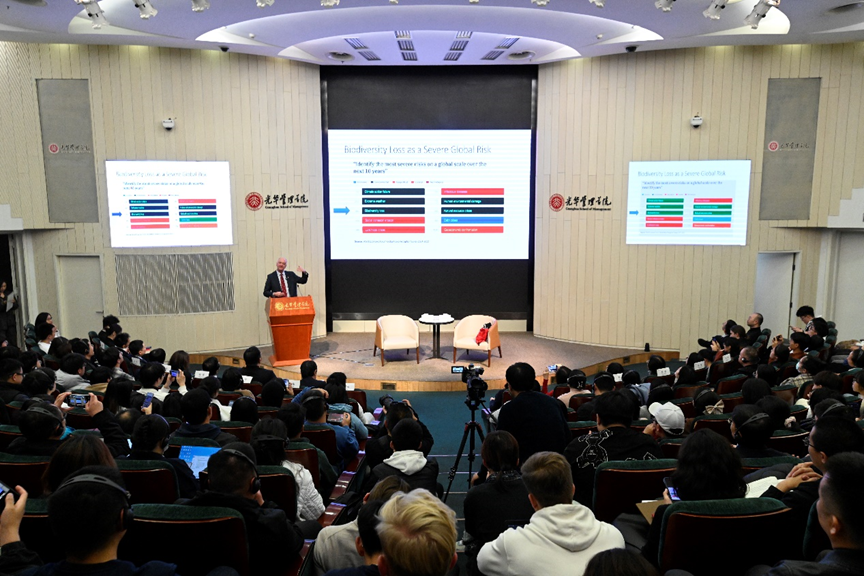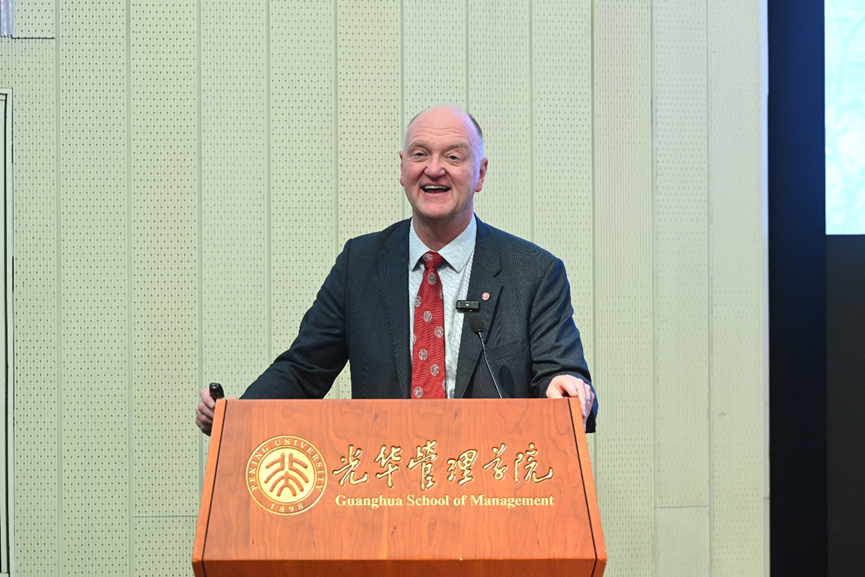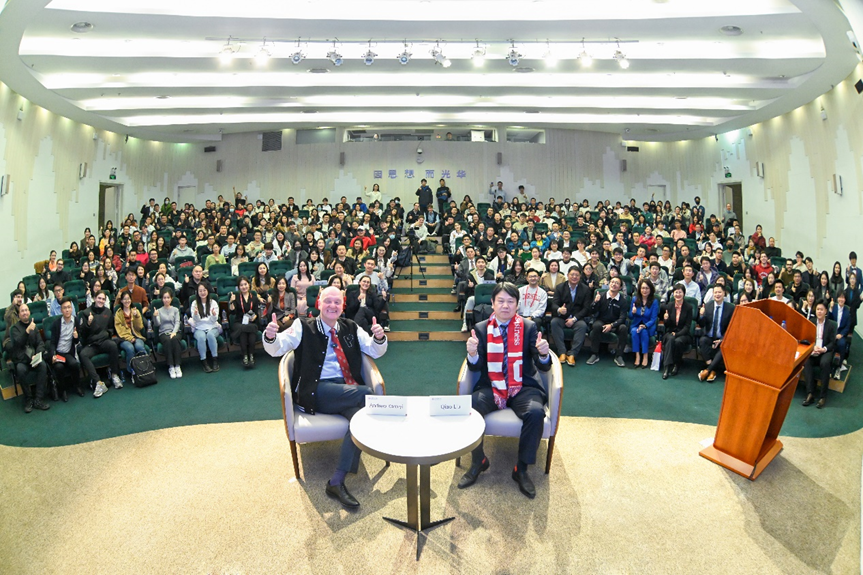Cornell SC Johnson Dean Andrew Karolyi speaks on biodiversity finance at PKU Guanghua School of Management
Nov 15, 2023
Peking University, November 14, 2023: Peking University Guanghua School of Management (GSM) on Nov. 8, 2023, welcomed Dean Andrew Karolyi from Cornell SC Johnson College of Business as the featured guest speaker for the Guanghua Thought Leaders Series. The evening centered around Dean Karolyi's keynote address on "Biodiversity Finance: The Next Frontier?", offering a comprehensive exploration of this emerging field.
The event also featured a dynamic dialogue between Dean Karolyi and Dean of GSM Liu Qiao, continuing beyond the stage as students actively engaged with the speakers during a Q&A session.
A Biodiversity Finance Imperative: Addressing the Urgent Need'
In Andrew Karolyi’s speech, he shed light on the critical issue of biodiversity loss, emphasizing its substantial impact on global GDP and compelling the financial sector to play a pivotal role in averting this impending crisis. He revealed a profound connection between a significant portion of the world's GDP and nature, exemplified by a 60% decline in key species populations over the last four decades. The severity of biodiversity loss is further underscored by its ranking as the third-highest global concern in the World Economic Forum's survey. Despite the severity of the issue, Karolyi highlighted a staggering $700 billion gap in annual financial flows towards conservation efforts, prompting the need for a transformative shift towards private capital markets as governments struggle to bridge this financing deficit.
Framing the Research on Biodiversity Finance
Andrew Karolyi introduced the emerging discipline of biodiversity finance, stressing the imperative for collaboration between scholars and businesses in tackling this intricate issue. He defined biodiversity finance as "the practice of raising and managing capital and using financial tools to support sustainable biodiversity management," laying the foundation for a field that harmonizes finance and ecology. Karolyi identified three crucial steps to propel biodiversity finance research: establishing a comprehensive data observatory, developing a standardized unit of measure for biodiversity loss, and creating mechanisms to connect corporate actions with biodiversity impact. These practical foundations provide tangible entry points for scholars, businesses, and investors keen to contribute to the progress of this growing area.
Exploring Big Questions in Biodiversity Finance
Exploring key questions in biodiversity finance, Andrew Karolyi emphasized the centrality of data and advocated for establishing a biodiversity finance data observatory. This comprehensive database, covering diverse financial instruments, formed a vital foundation for rigorous research. Addressing the challenge of measuring biodiversity loss, Karolyi proposed the utilization of geospatial techniques to link corporate actions with biodiversity impact, facilitating the creation of a standardized unit of measure. Looking ahead, Karolyi envisioned a scenario where investors, armed with insights, strategically influenced corporations to adopt sustainable practices.

Following the keynote speech, Andrew Karolyi engaged in an insightful dialogue with Dean Liu Qiao. They explored the convergence of biodiversity and finance, examining how economic incentives could address environmental challenges. Liu expressed concerns about private entrepreneurs investing in biodiversity, citing a funding gap and lack of incentives. Karolyi proposed establishing a marketplace for biodiversity loss credits and debated the roles of government versus private markets in taking the lead. Stressing the importance of responsible research in business and management, both deans highlighted the significance of relevance and interdisciplinary collaboration, envisioning a future where business schools actively contribute to addressing global challenges.

The event concluded with a dynamic Q&A session with the audience, during which Karolyi addressed a wide array of questions on biodiversity finance. Students explored topics such as evaluating returns in environmental projects, the integration of artificial intelligence in business and environmental sustainability, and the anthropocentric perspective on biodiversity. Karolyi provided insightful responses, emphasizing the need for concrete plans and operational goals in environmental initiatives.
Group photo
This event was part of the Guanghua Thought Leaders series, which exposes the next generation of business professionals to industry executives, government leaders, and pioneering academics who have transformed their fields. Previous speakers have included Nobel Laureate Dr. Robert Wilson, former Indian Prime Minister Dr. Abdul Kalam, Chairman and CEO of BlackRock Laurence D. Fink, former Chairman of General Electric Jeffrey Immelt, Financial Secretary of the Hong Kong SAR Paul Chan Mo-po, and Starbucks founder Howard Schultz.
About Cornell-Peking MMH/MBA Program
Combining a Master of Business Administration (MBA) degree with a Master of Management Hospitality (MMH) degree is a great way to acquire general business management skills with specialized service industry knowledge. The Cornell-Peking MMH/MBA is a dual-degree program offered by the Cornell Peter and Stephanie Nolan School of Hotel Administration and the Guanghua School of Management at Peking University. At Peking University, you can earn an MBA degree along with an MMH degree from Cornell University in a well-compressed timeframe while keeping your current career steadily moving on.
The mission of the program is to educate the next generation of leaders in the service industry in China with global perspectives and capabilities. If you want the best and wish to learn with the best, this is a MUST. The Cornell-Peking MMH/MBA Program will equip the program’s prospective students with the essential skill sets for a variety of careers that require a depth of business management knowledge, ethics, and hospitality as well as financial services acumen.
Source: PKU Guanghua School of Management




